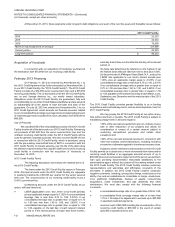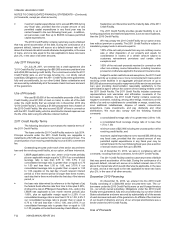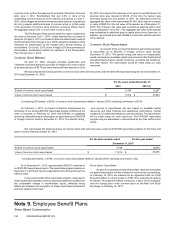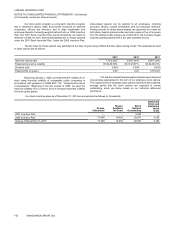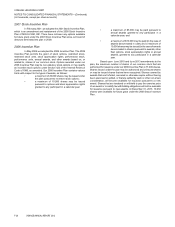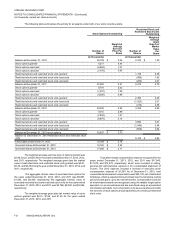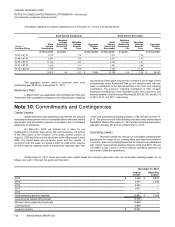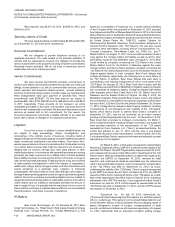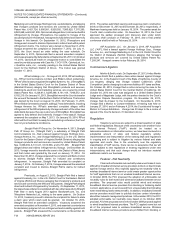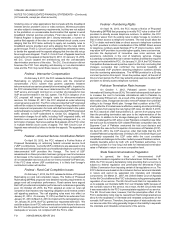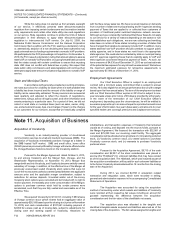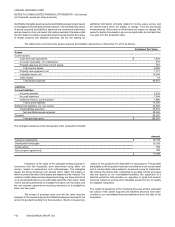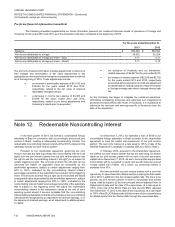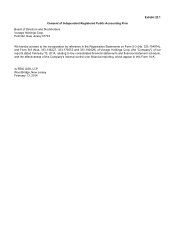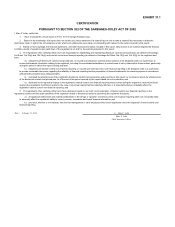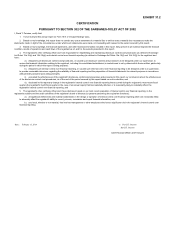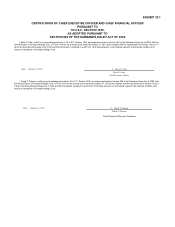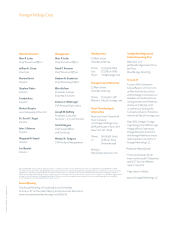Vonage 2013 Annual Report Download - page 87
Download and view the complete annual report
Please find page 87 of the 2013 Vonage annual report below. You can navigate through the pages in the report by either clicking on the pages listed below, or by using the keyword search tool below to find specific information within the annual report.
F-31 VONAGE ANNUAL REPORT 2013
hindering voice or video applications that compete with the broadband
Internet service provider's voice or video services. Wireless providers
are also subject to transparency requirements, but they are not subject
to the prohibition on unreasonable discrimination that applies to wired
broadband Internet services providers. Final rules were filed in the
Federal Register in September 2011. Shortly thereafter, a number of
parties filed appeals of the rules in various federal circuit courts; some
alleging that the FCC lacks authority to apply net neutrality rules to
broadband service providers and some alleging that the rules did not
go far enough. The D.C. Circuit Court of Appeals was selected by lottery
to decide the appeals and the appeals alleging that the rules did not go
far enough were dropped. The D.C. Circuit Court of Appeals heard oral
arguments on the appeal on September 9, 2013. On January 14, 2014,
the D.C. Circuit vacated the anti-blocking and the unreasonable
discrimination provisions of the rules. The D.C. Circuit decision did not
foreclose the FCC from adopting anti-blocking or non-discrimination
rules and the FCC may revisit these issues or appeal the ruling.
Federal - Intercarrier Compensation
On February 9, 2011, the FCC released a Notice of Proposed
Rulemaking on reforming universal service and the intercarrier
compensation (“ICC”) system that governs payments between
telecommunications carriers primarily for terminating traffic. In particular,
the FCC indicated that it has never determined the ICC obligations for
VoIP service and sought comment on a number of proposals for how
VoIP should be treated in the ICC system. The FCC's adoption of an
ICC proposal will impact Vonage's costs for telecommunications
services. On October 27, 2011, the FCC adopted an order reforming
universal service and ICC. The FCC order provides that VoIP originated
calls will be subject to interstate access charges for long distance calls
and reciprocal compensation for local calls that terminate to the public
switched telephone network (“PSTN”). It also subjected PSTN originated
traffic directed to VoIP subscribers to similar ICC obligations. The
termination charges for all traffic, including VoIP originated traffic, will
transition over several years to a bill and keep arrangement (i.e., no
termination charges). Numerous parties filed appeals of the FCC order
in multiple federal circuit courts of appeal. The 10th Circuit Court of
Appeals was selected by lottery to decide the appeals. The appeals are
pending.
Federal - Universal Service Contribution Reform
On April 30, 2012, the FCC released a Further Notice of
Proposed Rulemaking on reforming federal universal service fund
(“USF”) contributions. Currently USF contributions are assessed on the
interstate and international revenue of traditional telephone carriers and
interconnected VoIP providers like Vonage. The level of USF
assessments on these providers has been going up over time because
of decreases in the revenue subject to assessment due to substitution
of non-assessable services such as non-interconnected VoIP services.
If the FCC does reform USF contributions, it is likely that Vonage's
contribution burden will decline.
Federal - Rural Call Completion Issues
On February 7, 2013, the FCC released a Notice of Proposed
Rulemaking on rural call completion issues. The Notice of Proposed
Rulemaking (NPRM) proposed new detailed reporting requirements to
gauge rural call completion performance. Rural carriers have argued
that VoIP provider call completion performance to rural areas is generally
poor. On October 28, 2013, the FCC adopted an order on rural call
completion that imposes new reporting obligations and restricts certain
call signaling practices. The call signaling rules went into effect on
January 31, 2014. On January 17, 2014, we filed for an extension from
January 31, 2014 to March 3, 2014 to implement the call signaling rules.
On January 30, 2014, the FCC granted our requested extension. We
could be subject to an FCC enforcement action in the future in the event
the FCC took the position that our rural call completion performance is
inadequate or we were not compliant with the FCC’s order.
Federal - Numbering Rights
On April 18, 2013, the FCC issued a Notice of Proposed
Rulemaking (NPRM) that proposing to modify FCC rules to allow VoIP
providers to directly access telephone numbers. In addition, the FCC
granted a waiver from its existing rules to allow Vonage to conduct a
trial of direct access to telephone numbers. The trial would allow the
FCC to obtain real-world data on direct access to telephone numbers
by VoIP providers to inform consideration of the NPRM. Direct access
to telephone numbers would facilitate IP to IP interconnection, which
may allow VoIP providers to provide higher quality, lower cost services,
promote the deployment of innovative new voice services, and
experience reductions in the cost of telephony services. Vonage
successfully completed the trial in certain markets and filed the required
reports on the trial with the FCC. On January 31, 2014, the FCC Wireline
Competition Bureau issued a positive report on the trial, concluding that
Vonage's successful trial confirmed the technical feasibility of
interconnected VoIP providers obtaining telephone numbers directly
from the numbering administrators. The NPRM provides for a 30-day
comment period on this report. Given the positive report, at the end of
this comment period, the FCC may adopt its proposed rule to allow VoIP
providers to directly access telephone numbers.
Pakistan Termination Rate Increase
On October 1, 2012, Pakistani carriers formed the
International Clearing House (ICH). This cartel subsequently took action
to increase the cost to terminate international calls to Pakistan by
approximately 500 percent . As a result of the implementation of higher
termination costs, Vonage was forced to remove Pakistan from unlimited
calling in its Vonage World plan. Vonage filed a petition at the FCC,
shortly after the ICH rates became effective, seeking an order prohibiting
U.S. carriers from paying the new higher ICH rates. On March 5, 2013,
the FCC issued an order that prohibits U.S. carriers from paying more
than the prevailing termination rate prior to the implementation of the
ICH rates. In addition to the Vonage challenge in the U.S., a Pakistani
carrier challenged the ICH action under Pakistani competition law. After
the trial court found that the ICH violated Pakistani competition law, the
Supreme Court of Pakistan overturned the trial court decision and
remanded the case to the Competition Commission of Pakistan (CCP).
On April 30, 2013, the CCP issued an order that holds that the ICH
violates Pakistani competition law. On May 9, 2013, the Sindh High Court
temporarily suspended the CCP order while the court considers
constitutional challenges to the order made by several Pakistani carriers.
Despite favorable action by both U.S. and Pakistani authorities, it is
currently unclear if or how long it will take for international termination
rates in Pakistan to return to a more competitive level.
State Telecommunications Regulation
In general, the focus of interconnected VoIP
telecommunications regulation is at the federal level. On November 12,
2004, the FCC issued a declaratory ruling providing that our service is
subject to federal regulation and preempted the Minnesota Public
Utilities Commission from imposing certain of its regulations on us. The
FCC's decision was based on its conclusion that our service is interstate
in nature and cannot be separated into interstate and intrastate
components. On March 21, 2007, the United States Court of Appeals
for the 8th Circuit affirmed the FCC's declaratory ruling preempting state
regulation of our service. The 8th Circuit found that it is impossible for
us to separate our interstate traffic from our intrastate traffic because of
the nomadic nature of the service. As a result, the 8th Circuit held that
it was reasonable for the FCC to preempt state regulation of our service.
The 8th Circuit was clear, however, that the preemptive effect of the
FCC's declaratory ruling may be reexamined if technological advances
allow for the separation of interstate and intrastate components of the
nomadic VoIP service. Therefore, the preemption of state authority over
our service under this ruling generally hinges on the inability to separate
the interstate and intrastate components of the service.
Table of Contents
VONAGE HOLDINGS CORP.
NOTES TO CONSOLIDATED FINANCIAL STATEMENTS—(Continued)
(In thousands, except per share amounts)


